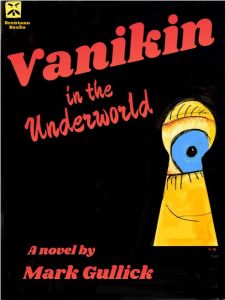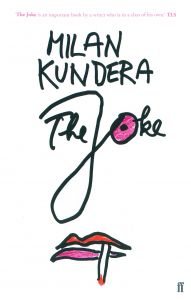Postcards from the Edge
Posted By Mark Gullick On In North American New Right | Comments DisabledMilan Kundera, trans. Michael Henry Heim
The Joke
New York: Harper, 1993 (1967)
Write it on a postcard.
Dad, they broke me.
— Pavement, “Stop Breathing”
As I mentioned in a previous episode [2], now that George Orwell’s 1984 has been wrung dry, it may be time for a new novel to call a warning to us from the past. Our enemies are systematically seeking to erase a whole range of freedoms notionally protected by the Constitution in the United States and Magna Carta in the United Kingdom. Foremost among these is free speech, and it is the quasi-criminalization of one of the most life-enhancing aspects of free speech that is at the center of Milan Kundera’s 1967 debut novel, The Joke.
The story is told from the perspective of different characters in the Prague of the 1960s, then under direct Communist rule and ruthlessly censorious of anything straying even remotely from the party line. But, although it is also a tale of love, friendship, desire, and tradition, I will concentrate on the novel’s central event, a joke written by a young Czech student.
The Joke has something in common with Camus’ The Outsider in that its main event provides a center of gravity for the rest of the novel. In The Outsider, during the few pages that tell of Meursault’s return to the beach to kill the Arab, the book explodes with kinetic verbs rarely found in the sedentary pace of the rest of the book. In The Joke, the appearance of the student before the politburo panel has a flat style at odds with some of the passion of the remainder of the novel, but the short section contains all the deadly seeds which will go on to become the flowers of evil currently blooming across the West.
And so we will concentrate on Ludvik, his fated postcard with its joke, and the reaction both of his girlfriend Marketa and, far more seriously, the social administrators of the Communist Party, who do not find the joke funny. Also, that will issue no spoilers if you wish to read the rest of the book, and it does repay inspection.
The joke itself is a short affair and, says Ludvik, “it all goes back to my fatal predilection for silly jokes and Marketa’s inability to understand them.” Many of us, especially in an age of social media, will have made a joke we come to regret. Only under a certain type of regime can that lead to more than minor embarrassment. But both America and the UK are rapidly becoming countries hosting just such regimes.
The joke is written on a postcard from Ludvik to Marketa. Ludvik is a student, and this is where we begin to see ominous similarities with the academic institutions of today and start to grasp why a tutor at one of Oxford’s prestigious colleges was fired for an overheard conversation in a café. Of his university environment, Ludvik relates that;
“I remember how we were all organised into “study groups” that met for frequent criticism and self-criticism sessions culminating in formal evaluations of each member.”
The only difference in the universities and colleges of today is that self-criticism would not now be concerned with the students’ adherence to Marxist doctrine, but would by proxy be the recognition of “white privilege,” while criticism of others is now exclusively directed at whites via the weaponized semiotics of skin color. It has been noted many times that cultural Marxism took the original version and substituted race for class to set up its dialectic of oppressor and oppressed.
A good student, Ludvik is confident that “if the public testimonials to my loyalty to the State, my hard work, and my knowledge of Marxism tended to be followed by a phrase along the lines of ‘harbours traces of individualism,’ I had no reason to be alarmed.”
Again, the feeling is all too familiar. We have all read of goodnik Leftist academics who have not quite come up to the ideological mark and have lost their jobs. The Left, particularly in academia, is a harsh mistress. If you don’t tick every box, she will punish you as though you hadn’t ticked any.
 [3]
[3]You can buy Mark Gullick’s Vanikin in the Underworld here. [4]
At chapter’s end, we are at the focal point of the novel, the equivalent of Meursault on the beach asking himself, what difference does it make if I shoot the Arab or not? As a miniature of the way that the contemporary progressives wish to replace healthy human feelings with programmed ticker-tape, the key paragraph is terribly sad. Ludvik and Marketa have one of those standard Leftist ideological conversations that mean nothing but muddle along using the type of comforting, echo-chamber jargon found today in Critical Race Theory. Afterwards, Ludvik muses;
As far as that goes, I quite agreed with what she said; I too believed in the imminence of a revolution in Western Europe; there was only one thing I could not accept: that she could be so happy when I was missing her so much. So I bought a postcard and (to hurt, shock and confuse her) wrote: Optimism is the opium of the people! A healthy atmosphere stinks of stupidity! Long live Trotsky! Ludvik.
And now the novel really begins. Marketa replies tersely and then when Ludvik calls a few days later he is told she has left Prague. This is how it starts, with the isolation of the transgressor. Soon, Ludvik is summoned to the District Party Secretariat. “From that moment,” he says, “I remember everything in perfect detail.” We recall the hyper-realistic description Meursault gives of the light glinting on the Arab’s knife. . .
And next, we see the grinding apparatus, the crushing gears of Communism at their inexorable work. Ludvik is not headed for the gulag — as was Solzhenitsyn after his joke — but a few words on a page have already changed his life, just as they are doubtless doing to someone somewhere as I am writing this.
The Politburo inquisitors begin by selecting one of Ludvik’s phrases and asking him what he thinks of optimism. Is he an optimist?
Do you consider yourself an optimist? they went on. I do, I said timidly. I like a good time, a good laugh, I said, trying to lighten the tone of the interrogation. Even a nihilist can like a good laugh, said one of them. He can laugh at people who suffer.
The politburo are consummate gaslighters who do not, or pretend they do not, understand irony, one of the key elements in humor and one not really understood now. Its definition has been tweaked in the last few decades, but its primary meaning remains the same. Irony is a rhetorical literary device, it is not coincidence. “Wow, how ironic that the guy who started that accidental fire was the chief fire officer!” No, that’s not ironic. It’s coincidental. Irony is when you say one thing and mean another. Sometimes it’s mixed with sarcasm. “Hey, nice jacket! Where did you get it? I might buy two or three.” Sometimes it is just acerbic. “That Don Lemon really tells it like it is.” But either way, Leftists don’t really get irony. In fact, they get very little that is in any way sophisticated, and tend to be excellent examples of what philosophers used to call the “Boo-Hooray Theory,” where everything is reducible to whether you are for it or against it.
Kundera’s skill — and we can be sure he is painting from life — is to produce threat and menace from short, caustic comments;
Comrades, it was meant to be funny, I said, feeling they couldn’t possibly believe me. Do you consider it funny? one of the Comrades asked the other two. Both shook their heads. You have to know Marketa, I said. We do, they replied.
Humour, however grim, lives on even under the iron heel of totalitarianism. I am reminded of the joke about the young Stalin sitting reading when the telephone rings. It is his girlfriend. She says, “Hey. Why don’t you come over tonight? My parents are not here.” Stalin replies, “I know.” The psychological effects of appearing before the Politburo were a large part of the method of Communist punishment. “I lived,” says Ludvik after the interview, “in a state of suspended animation.”
His student privileges withdrawn, Ludvik is no longer exempt from military service. This, of course, brings a wry smile to those of us who realize that a couple of years of military service today would be of far more use to a modern teenager than a near-worthless arts degree, but the important fact is that, after Ludvik’s little joke, his fate is out of his hands, and that transfer of control echoes loudest today. Once your freedom becomes a whim of the state, your troubles are only just beginning.
As I mentioned, I have singled out one short section of a longish novel, and the whole is worth reading particularly for the evocation of a Czechoslovakia — and by extension a world — gone now, replaced by those who would put you in the dock for a silly joke. Towards the end of the novel, Ludvik describes at length a nationalistic pageant called “the Ride of the Kings,” sadly realizing that;
At that moment I was filled with a sorrowful love; love for this world I had abandoned years ago, for this world, distant and ancient, in which horsemen ride around a village with a masked king, in which people walk around in white frilled shirts and sing songs. . .
As we are now finding out, one of the main strategies of our enemies is to destroy the past and, to the wrong type of person (although so right for the Party), national and cultural heritage is not destroyed just by pulling down a few statues and changing some road names. You must also get rid of the human joys. Humor, for example.
Milan Kundera, now 92 years old, is possibly best known for his 1984 novel The Unbearable Lightness of Being, and had his books banned in the former Czechoslovakia in the 1960s. It is always an excellent idea to listen to the voice of experience. Censorship — now revivified as “cancel culture” — is a voracious beast and its appetite is not easily satisfied. If they come for the jokes you tell today, they will be back for the things you meant seriously tomorrow.
* * *
Counter-Currents has extended special privileges to those who donate $120 or more per year.
- First, donor comments will appear immediately instead of waiting in a moderation queue. (People who abuse this privilege will lose it.)
- Second, donors will have immediate access to all Counter-Currents posts. Non-donors will find that one post a day, five posts a week will be behind a “paywall” and will be available to the general public after 30 days.
To get full access to all content behind the paywall, sign up here:
